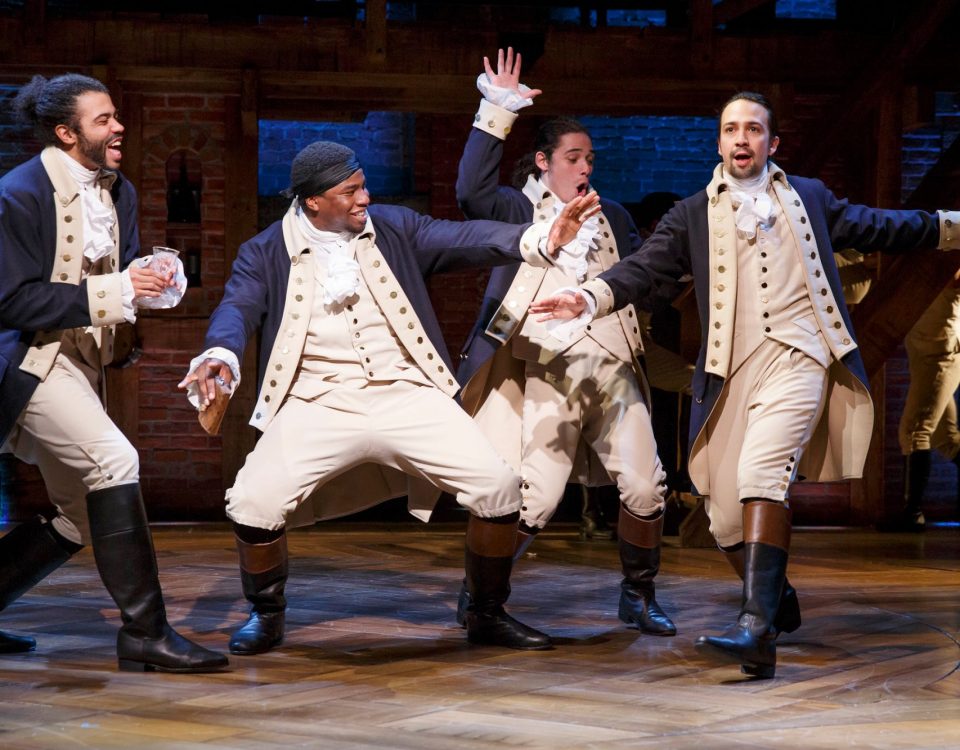Lifestyle
 The year of universal praise for the play Hamilton was not meant to last, as those who make a career of finding racial flaws were biding their time. “>
The year of universal praise for the play Hamilton was not meant to last, as those who make a career of finding racial flaws were biding their time. “>
Its been a shoe that had yet to drop.
The praise for Lin-Manuel Mirandas musical phenomenon has been resoundingly unanimous. There are already plans for a touring production, one in London plus a sit-down production in San Francisco. Miranda has performed for the president. The cast album has won a Grammy, Miranda himself a MacArthur. Hamilton is certainly about to sweep the Tonys. Musical theatre obsessives such as myself are having the odd experience of finding that our next door neighbor with no interest in musicals is actually listening to a theatre recording we love. One takes the shows name in vain no more than one would The Wire or Handels Messiah.
Or at least not until around now. You just knew a certain type was biding their time. Loving the show in itself, to be sure, but still harboring a certain sense of responsibilitya sense that Miranda, and Hamilton, and all of us by extension, are having a little too good a time.
Enter the contesters.
***
As in, what is pronounced con-TEST. The term is especially popular among identity-focused academics, the idea being that when encountering a piece of art, the intellectuals responsibility is to smoke out a sociopolitical faux pas in it. The first contestation on Hamilton to get around has been from Lyra Monteiro, a history professor at Rutgers, who (while thoroughly enjoying the show, mind you) assails Hamilton for underplaying that Hamilton was less than sustainedly committed to ending slavery, and for omitting the sheer presence of black slaves in the lives of the characters.
That most of the cast of Hamilton is black would seem to compensate for, or even constitute a kind of dialogue with, these omissions. But Harvard history and law professor Annette Gordon-Reed wants to turn our gaze from even that, asking whether we would find these omissions tolerable if the cast were white. She assumes that if we saw Hamilton and Co. played as usual, by whites then the virtual absence of slaves from the story would be more evident. Whites are contesting too: CUNY historian David Waldstreicher worries that the show trucks in a kind of Founders Chic, in which people like Hamiltons images are burnished to seem cool to us moderns, with one of his central complaints being the slavery issue.
These people are claiming that Lin-Manuel Mirandaa man of color himselfscrewed up. The charge is unfair and inept, and its time for some contestation of the whole school of thought that produces criticism of this kind.

Joan Marcus/courtesy Hamilton
For one, critiquing Hamilton as underplaying slavery implies that racist injustice must be, in any substantial artistic depiction of American history, front and center. Certainly, the near neglect of such issues among, for example, historians of another time, was indefensible. But at this point, that kind of historiography is now quite removed from us, and no one could claim that the role of slavery in Colonial American life is being kept under wraps. However, todays contesters insist on the opposite extreme from the old daysthat we are not to even think of Alexander Hamilton without genuflectively musing overand likely disapproving ofwhat his relationship was to black people in bondage.
But for all of the searing injustice that black people underwent in Hamiltons time, in the end black people were but one facet in lives lived as richly as ours, in a society as multifaceted and complex as ours. What is the argument that nevertheless, to our each and every conception of the Founders, race issues must cleave as reflexively as we memorize a French noun with its gendered definite article?
This insistence is akin to similar currents of thought dominant lately, under which race requires standards of assessment and reasoning unknown elsewhere. Example: cultural mixture, often amidst vast differentials in power, has been a default condition of humanity since its origins and generally celebrated as progressive. But we are taught that when it comes to black Americans, to imitate any of our cultural traits such as speech, hairstyles, gesticulations, etc., constitutes appropriation subject to, of course, earnest contestation.
I sense that an idea James Baldwin often expressed has a lot to do with this sentiment among the contesters: that culpability for slavery, Jim Crow, and racism is a foundational facet of being a white American. Under Baldwins view, whites, even individually, are fundamentally incomplete or broken without full acknowledgment of this responsibility. They are dimly, or vividly, aware that the history they have fed themselves is mainly a lie, but they do not know how to release themselves from it, and they suffer enormously from the personal incoherence. (The White Mans Guilt, 1965.)
The boildown version of this idea has become that race and racism are the very essence of what America is. However, this is the rare view of Baldwins which I have always found unconvincing. I dont have any reason to think the typical Trump voter suffers or feels at all incoherent about race and todays fashionable acknowledgments of white privilege is a Like button in the guise of political activism. The idea that a critical mass of whites are existentially torn up about black people strikes me as wishful thinking, and the frustration of writers like Ta-Nehisi Coates suggests that they would agree with me, if rarely elsewhere, on this. And overall, this country is too vast and protean a mess for the idea to hold up that any single factor, even as massive and tragic as the racial one, constitutes the key to the whole business. Yes, there is race. But there is a humongous deal more, and there always has been.
This questions the idea that any prominent engagement with an Alexander Hamilton is grievously incomplete without, say, as Monteiro would prefer, showing slaves dressing the Schuyler sisters and doing their hair. Of all that life was for those women and Hamilton, why must a musical about these people not just mention and show slaverywhich Hamilton, it must be noted, doesbut sit down and focus on it? Our contesters tell us that it isnt right that Miranda decided to focus his musical about Alexander Hamilton solely on the mans forging of a nation. No, if a depiction of Alexander Hamilton is going to get this much play, then backgrounding his take on the slave trade is as unforgivable as making a musical about Hitler that leaves out the part about the Jews. Really???

Joan Marcus/courtesy Hamilton
Calls of this kind are especially pernicious in their self-perpetuating quality: too often if the contesters got what they wanted it would only furnish fodder for more contestation. For example, these same kinds of critics hated the film The Help, because even though it graphically depicted the implacably racist life black maids in the deep South endured in the 1950s and 1960s, the assassination of NAACP field secretary Medgar Evers was not shown and not the center of the story, the story focused on the maids rather than the racist actions of the whites, the cinematography was too glossy, the script depicted some humor, and we learned nothing about white men raping their maids.
***
Never mind that The Helps director Tate Taylor brought the actual black woman who had been a maid in his house to a showing of the film and she loved it, or that legions of people of color are rising from their seats at Hamilton every night and will be doing so for at least a decade across this nation and on the other side of the world. Our contesters see themselves as bearers of a higher wisdom unavailable to that maid or the unknowing folk shelling out their bucks to get a look at the Hamilton miracle. But how high is this wisdom, really? That which we are told is ahead of the curve often seems rather crude.
For example, our understanding of the basic equality of all humans had yet to take root among any human beings on earth two and quarter centuries ago. Possibly, one may have had a certain interest in slavery, but only that, usually subsidiary to things one found more compellingsuch as, in Hamiltons case, helping to establish the philosophical and procedural foundations of an exceedingly delicate yet promising political experiment called the United States of America amidst sustained and ferociously intelligent resistance. In the 1700s, one grew up with slavery as part of the warp and woof of life, and Alexander Hamilton was a very busy man.
To the contesters, what Hamilton was so busy creating is invalidated by the fact that slavery reigned unquestioned within itwe must, therefore, permeate the story with an issue Hamilton himself didnt prioritize during his shortish life, and judge him about that. However, this is an almost willfully uncomprehending perspective. It would be valid to utterly dismiss a political experiment founded in slavery today, indeed. However, the chance that a person can see completely beyond the ideological confines of their time is small. Even smaller are the chances that they will have the stomach to devote their entire life to fighting for a principle in the face of certain dismissal and resistance. And even smaller than this are the chances that someone will devote themselves to such a self-abnegating quest while dedicated to as massive a project as, say, creating a nation.
To consider Alexander Hamiltons lack of passionate commitment to abolition a central pillar of what he should mean to us today, then, is less higher wisdom than faulty logic. It is premised on a fundamental lack of understanding of the evolutionary nature of social history, and an inability to conceive of the basic nature of personhood within it. To tar any portrait of a historical figure as incomplete without blaring announcement of their failure to pass todays antiracism test is a kind of witch-hunting in the guise of civic discussion.
It is certainly a rather blinkered take on art. The Hamilton sequence introducing the Schuyler sisters is one of the most thrilling I have ever seen in the theatre, convincing me immediately that the buzz was apt for a show I was afraid wouldnt live up to its reputation. Look around, look around, the beautiful actresses sing, trumping the whiteness of the characters they are playing in their multiple hues. Angelica Schuyler, of all people, will now likely forever be spontaneously imagined as an imperiously lovely black woman like Renee Elise Goldsberry, just as a new generation of kids spontaneously imagine Americas president as a pensive black man. Dazzling stagecraft and wordplay fill the sensesthis is what the theatre is for, something that would have seemed utterly inconceivable when lily-white old chestnuts like Good News and Guys and Dolls were playing on the same stage at the Richard Rodgers theatre in days of yore. To come away from such an epic happening, this gift from an awesome talent, asking Where were the slaves? is less constructive thought than recreational Puritanism.
***
If todays climate of religious antiracism is any indication, however, it will be deemed urgent to take these contestings into account for future mountings of Hamilton. Get ready for versions in the 2030s with the chorus bulked out to include a few people playing slaves, and for it to become established to reinsert a slavery number Miranda actually wrote for the show but cut for time.
What any of this will have to do with America making genuine progress on race will be unclear and, ultimately, of no concern to the usual suspects. This kind of professional Cassandraism is less a proactive tool than an unchanging stance. However, the rest of us wonderful people out there in the dark, as Norma Desmond put it in Sunset Boulevard, will in all of our benightedness continue to see Hamilton as just fineand really, quite a bit more than fineas it is.




